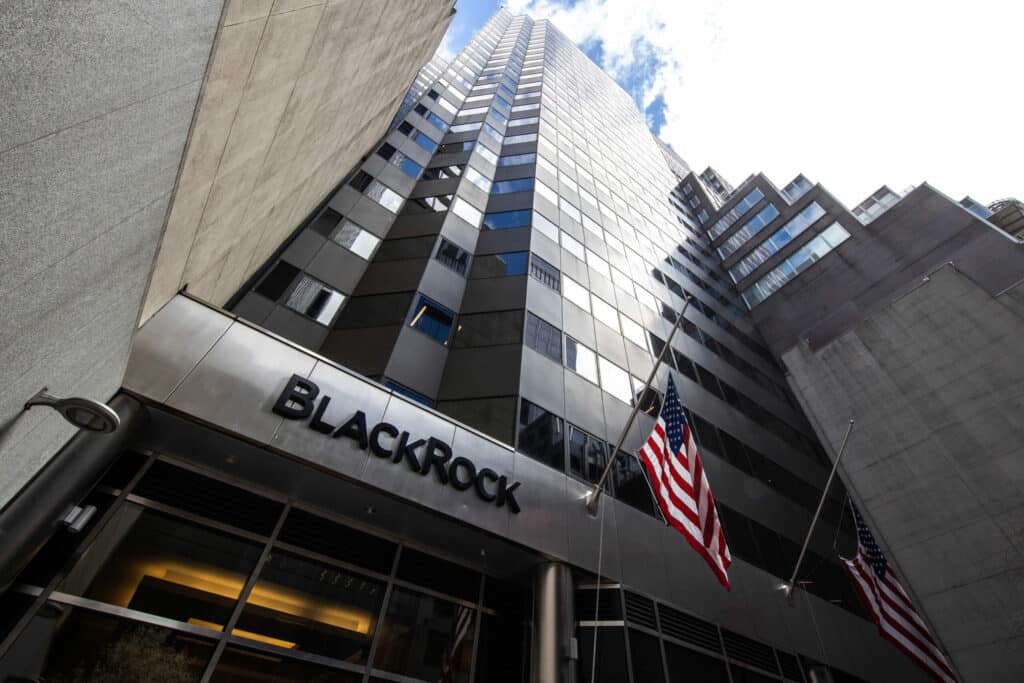Blackrock World Technology Fund Review – that will be the topic of today’s article.
Explore the Blackrock World Technology Fund and how it compares to the Utmost International Executive Redemption Bond.
Nothing written here should be considered as financial advice, nor a solicitation to invest.
For any questions, or if you are looking to invest as an expat, you can contact me using this form, or via the WhatsApp function below.
Introduction

BlackRock, Inc. Is an American multinational investment management corporation based in New York. Founded in 1988 initially as a risk management and institutional fixed income asset management company, BlackRock is the world’s largest asset manager with $ 9.5 trillion in assets under management as of October 2021. BlackRock operates worldwide with 70 offices in 30 countries and customers in 100 countries.
BlackRock is committed to positioning itself as an industry leader in Environmental, Social, and Corporate Governance (ESG). The company faced criticism for its inaction due to climate change, close ties with the Federal Reserve during the coronavirus pandemic, anti-competitive behavior, and unprecedented investment in China.
With 401 (k) clients and other investments, BlackRock is the largest shareholder in many competing public companies. For example, see the percentage of shares held by BlackRock: Apple (NasdaqGS: 6.34%) and Microsoft (NasdaqGS: 6.77%), Wells Fargo & Co (NYSE: 4.30%) and JPMorgan, Chase & Co (NYSE: 4.41%). This concentration of ownership has raised concerns about possible anti-competitive behavior.
A 2014 study entitled Anti-Competitive Effects of Common Ownership analyzed the impact of this type of common ownership on airfare. The study found that “prices rise and quantity decreases when airlines competing on a given route are more likely to belong to the same set of investors.” common owners, but perhaps these firms are now “too lazy to compete” with themselves.
BlackRock is a shareholder in many institutional investors who own BlackRock shares. This chain of ownership is similar to the cyclical ownership structures that have been identified, for example, in the United Kingdom.
Investing in China
In August 2021, BlackRock established its first mutual fund in China after raising over $ 1 billion from 111,000 Chinese investors. BlackRock became the first foreign-owned company to be authorized by the Chinese government to conduct a wholly-owned business in the China mutual fund industry. In an article for The Wall Street Journal, George Soros called the BlackRock initiative in China a “tragic mistake” that would “harm the national security interests of the United States and other democracies.”
In October 2021, the non-profit group Consumers’ Research launched an ad campaign criticizing BlackRock’s relationship with the Chinese government.
In December 2021, it was reported that BlackRock was an investor in two companies blacklisted by the US government for human rights violations against Uighurs in Xinjiang. In one case (Hikvision), BlackRock increased its investment after the company was blacklisted.
What are technology funds?

As the name suggests, these funds only invest in stocks that are part of tech sector. These funds cannot invest in any sector other than technology. A typical portfolio includes 10-20 of top technology companies.
The proceeds from these funds are driven by the growth in revenues and profits of technology companies. Most of the companies export software and provide services to global clients. Thus, the success of these companies has more to do with economics and regulation in other countries, especially in the US and Europe.
Some of the technology companies are market leaders in certain segments. Most of them have grown primarily on cheap labor, an English-speaking population, and sound technical skills in many countries. More recently, stricter regulations in some countries and a lack of innovation have hurt Indian tech companies.
If you think you have an interest in investing in tech funds and you need professional advisory, check out this form and apply, we will be happy to assist you.
Is it worth investing in tech funds?
Technology is a buzzword today and its use is growing in all sectors and aspects of life. Globally, some technology companies rank among the largest corporations in the world and are also among the most profitable stocks.
The NASDAQ, the US tech index, has been one of the best performing indices in the world. This is due to the rapid growth in digitalization and innovation that these companies have made.
On the other hand, most technology companies have followed the business model of providing software and server services to Western corporations. They are quite successful at this thanks to the young English-speaking population and labor arbitration. However, they lacked the innovation to propel them into the big leagues of the world’s best tech companies.
Most tech companies have stable earnings and cash flows, but growth has been sluggish. Profit growth is the most important factor in the success of a stock. Going forward, technology fund returns will depend on the future growth these companies can demonstrate. These funds are also prone to volatility due to currency movements and rule changes.
It is recommended to avoid investing in technology funds for the above reasons. If you are looking to fund the best tech companies, it is advised to invest in multi-cap funds that have funds allocated to the best tech companies/stocks.
Blackrock World Technology Fund

The World Technology Fund strives to maximize overall returns. The fund globally invests at least 70% of its total assets in equity securities of companies whose main economic activities are related to the technology sector.
BlackRock’s business risks, as shown above for steam coal and oil sands, are calculated and reported for companies that generate more than 5% of their revenue from steam coal or oil sands as determined by MSCI ESG Research. For companies that earn any income from steam coal or tar sands (at a 0% income threshold), as defined by MSCI ESG Research, these are thermal coal 0.00% and oil sands 0.00%.
Business Participation Metrics are calculated by BlackRock using data from MSCI ESG Research, which provides each company’s business engagement profile. BlackRock uses this data to obtain a consolidated view of the assets and translates it into the market value of the fund in the business areas listed above.
ESG integration
ESG Integration is the practice of incorporating material environmental, social, and governance (ESG) information or ideas alongside traditional measures into investment decision-making to improve the long-term financial performance of portfolios. Unless otherwise stated in the Fund’s documentation or included in the Fund’s investment objective, the inclusion of this statement does not imply that the Fund has an ESG-focused investment objective, but rather describes how ESG information is viewed as part of the overall investment process.
The fund manager takes ESG considerations into account in combination with other information during the research phase of the investment process. This may include relevant views of third parties, as well as internal communications and comments from the BlackRock Investment Stewardship on governance matters.
The Fund Manager conducts regular portfolio reviews with the Risk and Quantitative Analysis Team and Chief Investment Officers. These reviews include a discussion of the portfolio’s exposure to significant ESG risks, as well as exposure to sustainability-related business borrowings, climate-related metrics, and other factors.
Pros of investing in mutual funds
Professional portfolio management
The customized portfolio is managed by seasoned industry professionals with expertise in the field. They continually manage your portfolio to help you get the most out of your investment.
Availability
You can buy mutual funds of smaller denominations, ranging from $ 100 to $ 1000. Smaller mutual fund denominations allow investors to make recurring investments as part of their regular monthly buying plans. Instead of waiting for enough money to buy more expensive investments, you can invest in mutual funds right away.
Diversification
Mutual funds can invest in securities of various asset classes such as bonds, commodities, or cash. This helps to diversify the portfolio. If one sector is performing poorly, there is a high likelihood that other sectors will make up for the loss.
Accessible
Investing in mutual funds is very affordable as an individual can invest from as little as $10 every month to a mutual fund. There is no fixed amount that can be invested. Thus, even a small investor can participate in the market by investing in mutual funds.
Liquidity
All it takes to exit a mutual fund is one instruction to your broker/agent to sell it. Funds are returned to your account within 48 hours.
Cons of investing in a mutual fund
Fees and expenses
Mutual funds charge their clients an annual fee, known as the expense ratio, regardless of the fund’s performance. This can be defined as the cost of running a business. In addition, there is an exit load on mutual fund schemes if an investor wishes to buy back investments before a certain period of time.
Blocking clause
There are two types of mutual fund schemes: one that allows you to enter and exit at any time is known as an open scheme, and the other has a blocking period of 3-5 years that is closed. ended the scheme. If an investor wishes to buy back the investment before the blocking period, he needs to pay a certain amount as an output load.
Not guaranteed
There is no guarantee that your mutual fund will be performing well, and it could technically drop to $ 0 if all underlying assets drop to zero.
Volatility
Mutual funds can experience market fluctuations and sometimes generate returns below the general market. The level of risk and return depends on what the fund is investing in.
Capital gains
When you sell an investment for a profit, you must pay capital gains taxes. With most investments, you are in control of when you sell them, so you are in control of when you have to pay taxes. Mutual funds must regularly distribute the capital gains they earn, which gives you less control over when you pay capital gains taxes. This can make it difficult to use tax minimization strategies such as collecting tax losses.
It is always advisable to consult with a financial advisor and understand all points before investing in mutual funds. That is why you are always welcomed with any kind of questions, we will give you the right advices, strategies, and tips on how to make your first investment.
Pained by financial indecision? Want to invest with Adam?
Adam is an internationally recognised author on financial matters, with over 352.9 million answers views on Quora.com and a widely sold book on Amazon



